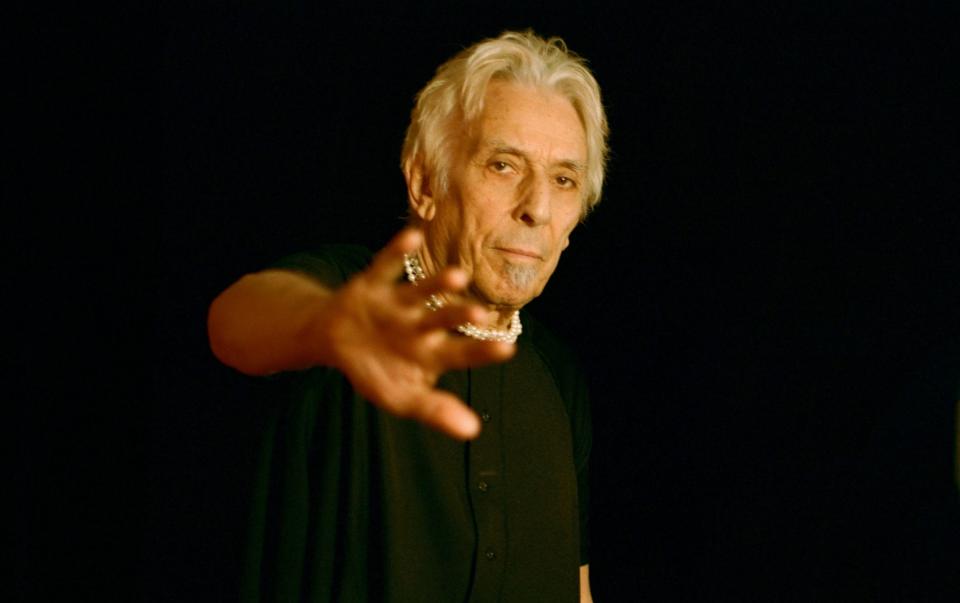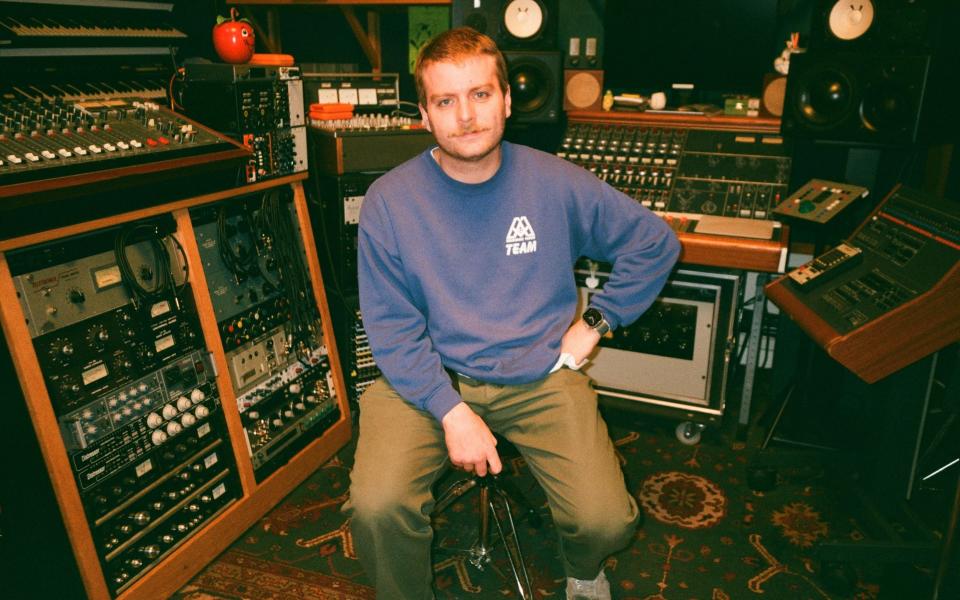John Cale resists nostalgia, Måneskin are making rock fun again – the week’s best albums

John Cale, Mercy ★★★☆☆
John Cale may be an artist more written about than listened to, something his dense and dour 17th solo album is unlikely to change. Mercy is a typically fascinating work of sonic layering and amorphously misshapen songcraft: moody, atmospheric and as elusive as the tail end of a bad dream. Having managed to stay off the radio and almost entirely out of the charts for over 50 years, the avant garde veteran is not about to change the habits of a lifetime now.
The 80-year-old Welshman has led a fascinating and influential career on the fringes of experimental rock. A classically trained viola player and disciple of Stockhausen, Aaron Copland and La Monte Young, Cale helped integrate concepts of dissonance, minimalism, drones, ambience and serialism into pop culture, with innovative deployments of orchestras and electronics and an instinct for gritty rock’n’roll. He is still chiefly celebrated as a founding member of the Velvet Underground, a group only really appreciated once they’d broken up, and in which his role has been unfairly perceived as secondary to Lou Reed.
Indeed, despite releasing 16 previous solo albums and composing scores for around 40 films (including Basquiat and American Psycho), Cale’s impact might best be measured by his collaborations. He produced albums for The Stooges, Nick Drake, Patti Smith, The Modern Lovers, Siouxsie and the Banshees, the Happy Mondays and Nico, also working with Brian Eno and David Bowie (who called him “one of the most underrated musicians in rock history”). Mercy brings Cale’s collaborative instinct bang up to date by incorporating cutting-edge talent from contemporary pop fringes, including singer-songwriter Weyes Blood, multi-instrumentalist Dev Hynes, elastic R’n’B vocalist Tei Shi, electronic adventurers Sylvan Esso, Laurel Halo and Actress and iconoclastic bands Animal Collective and Fat White Family.
Such a hipster congregation is indicative of Cale’s revered status, perhaps especially given the way they have all been absorbed into his sonic textures rather than imposing their individual characters. Treated voices and distorted instrumentation knit almost invisibly into mantric drones and cyclic chord progressions. Skittery drum machine rhythms and oblique electronic noises disrupt echoing washes of orchestra and ghostly synths, whilst layers of Cale’s thin voice – both nakedly exposed and heavily processed – intone imagistic lyrics infused with mordant melancholy and nihilistic resignation.
Cale has always been hampered by the weedy timbre of his voice. It is not that he can’t sing, it is more that he struggles to hold the centre of attention, while his cryptic lyrics fall short of the heights reached by more celebrated wordsmiths he has worked with. Age, though, suits his dry tone, and perhaps adds gravitas to his poetic opaqueness. “Lives do matter / Lives don’t matter / Wolves getting ready,” he proffers on the opening title track, like an ancient observer reporting on the apocalyptic follies of mankind. It rarely gets much more cheerful than that.
Mercy is not an easy listen, but it is nevertheless inspiring to hear an octogenarian artist declining the comforts of nostalgia, still forging his own wayward path, opening byways for others to explore at their leisure. Neil McCormick

Ladytron, Time’s Arrow ★★★☆☆
Liverpool quartet Ladytron’s seventh album Time’s Arrow is immersed in the dusky haze of synthpop that fudges the boundaries between 90s shoegaze ambience and early 80s New Romantic.
Suitably, Ladytron adopted their moniker from the eponymous 1972 song by Roxy Music. Helen Marnie, Mira Aroyo, Daniel Hunt and Reuben Wu have never been shy of baring their electropop, computer-music influences in their percussive, romantic, heavily melodic tunes. Their music belongs in a smoky nightclub, where the swaying bodies are clad in clingy black outfits and heavy eyeliner under lights diffused into a dim fog. Think of London’s Wag Club or Electric Dreams Club where burgeoning fashionistas rubbed elbows with the seedy set to the sexy pulse of new wave electro. We Never Went Away, a slithering, juicy ambient-synth number is a sly wink to the media that has focused on the band’s hiatus between the end of 2011 and re-emergence on their self-titled 2019 album.
Hunt spent time producing for like-minded shoegaze, synth-band Lush (the 2016 Blind Spot EP), while Marnie showcased her solo songwriting skills across a couple of albums. Over twenty years have passed and yet Ladytron sound nearly identical. This might please hardcore fans, and if Time’s Arrow were a soundtrack to a grim, moonlit landscape of robots and trains and half-demolished buildings it would work beautifully in atmospheric tandem. The problem is that it feels dated and without a solid, resonant purpose.
Ladytron transitioned from the sparkling, sardonic Light and Magic (2002) to Velocifero’s gothic glamour in 2008 and apocalyptic, retro dreams of the future on their last release, Ladytron. Their major hits with sing-along choruses (Destroy Everything You Touch, High Rise, Seventeen) retain their Bladerunner-meets-Heathers horror-goth-girl allure, but we haven’t been gifted an album that feels necessary and new to their repertoire. A brew of sinister synth waves nearly stagnates where we want it to cascade, and harmonies twine around one another where we want them to soar into anthems. In short, a potential blaze delivers a fizzle. Cat Woods
Måneskin, RUSH! ★★★★☆
At one point in the six months after they sashayed to Eurovision victory in 2021, Måneskin hit almost 40 million streams a month on Spotify, making them one of the most played artists on Earth. While the following year’s runner up, the UK’s long-haired teddy bear Sam Ryder, has done very nicely for himself since the Song Contest, ringing in the New Year with his own rocking TV special like a young Tom Jones, the ultra-cool Roman rock’n’roll quartet became, in streaming terms, bigger than The Beatles. Almost twice as big, actually.
Are they as good? No. But Måneskin won their title largely through sheer excitement – big, loud rock’n’roll thrills bursting with panache and style and charisma and sex. On third album RUSH! this modus operandi remains so: every OTT moment here is designed to dazzle. Bla Bla Bla and Feel are on-point pop-rock beamed straight from 1970s AM radio, while the strutting Own My Mind (one of the songs here that sees frontman Damiano David singing in English rather than his Italian mother tongue for the first time) charms with an olive oil smoothness.
This is Måneskin’s big strength. The songs on RUSH! may not be particularly original, reading heavily from a well-thumbed big-riffs-and-good-times playbook, but they write a very good one, and play them with an energy that frequently boils over with exuberance. There’s the odd moment of surprise, like when Kool Kids suddenly delivers a punked-up punch, or the appearance of Rage Against The Machine guitarist Tom Morello on the fabulous Gossip, but absolutely nothing to distract from an apparent mission statement of cramming the world’s best Friday night into a record.
If this simple recapturing of rock’s grand old sense of fun seems unambitious, it’s not. Måneskin sound like they want to be the biggest band in the world. Moreover, they sound like they’re hungry enough not to rest until they are. Nick Ruskell

Mac DeMarco, Five Easy Hot Dogs ★★★☆☆
Music’s foremost producer of the self-coined genre “jizz jazz” Mac DeMarco returns with his fifth full-length studio album, Five Easy Hot Dogs. Conceived during a four month road trip through North America, each track is instrumental and recorded, mixed in and named after the corresponding city.
If the title isn’t already an inference of what to expect, it is the Canadian multi-instrumentalist at his most intimate. With his earlier career characterised by anarchic stage antics and a puerile yet charming disposition, the 14-track album makes no attempts to grab attention. It isn’t the complete return to form from 2019’s more mature yet lukewarm affair, Here Comes The Cowboy, which was noted in its stylistic departure from his sardonic jangle rock beginnings. Yet this album is intentionally less polished, noted in the rustles and creaks that can be heard intermittently.
His Viceroy cigarette honed vocals are absent throughout, bar a softly whispered four-count at the start of opener Gualala – De Marco recently revealing that he gave up the habit during the recording. The melodies meander, aided by a Yamaha-TX7 which often takes over topline duty. At times, it feels directionless, even monotonous. There is the sense of feeling lost or isolated, most evident in Crescent City, with its repeated droning synths befitting for a coastal city with a population shy of 7,000 and a susceptibility for tsunamis.
Tracks that correspond with more populous cities, such as Portland 2 and Chicago, feel more sprightly and familiar with their punchy guitar-led melodies, but it is the Edmonton couplet, an ode to his home city, that feels the most wistful. Whilst it is purposefully lacking in intention, the experimental album has its moments of whimsy but feels noticeably devoid of humour, surprising for a musician known for his zaniness. Still a cohesive affair, it’s an apt depiction of transience and Mac DeMarco is taking us all along for the ride. Jumi Akinfenwa
The Murder Capital, Gigi’s Recovery ★★★☆☆
The Murder Capital’s debut album was the cathartic, visceral reaction to the death of a close friend from suicide. Released in 2019, When I Have Fears was an intense outpouring of anguish that saw the Dublin five-piece join their fellow post-punkers at the pointy end of a new, exciting scene.
In the years that followed though, those trailblazers have done their best to escape the confines of post-punk by trading angular guitars and abrasive lyrics for something more tender (Fontaines D.C’s Skinty Fia) or upbeat (Idles’ Crawler). The Murder Capital also strive for something new on second album, Gigi’s Recovery.
Written over the course of two years, with the band proudly sticking to the mantra “the evolution will not be compromised”, Gigi’s Recovery is a tightly-wound concept record. Flickering between the pain of what’s come before and a jubilant hope for the future, there’s an intensity to it all.
Gigi’s Recovery starts with the familiar though. After a piano backed spell of brooding poetry, the bombastic Crying pits vocalist James McGovern’s spat lyrics against punishing guitar while Return My Head captures the urgency of their debut album. Ethel is driven by a heightened sense of longing before The Stars Will Leave Their Stage adds a theatrical flourish to The Murder Capital’s moody swagger.
Things get more experimental in the second half of the album. A Thousand Lives is a full-blown love song, backed by some Radiohead-inspired percussion, We Had To Disappear is polished and poppy while the five-minute title track veers comfortably towards post-rock. “I am not my sorrow,” sings McGovern, desperate for The Murder Capital to be seen as more than gloomy post-punk. The joyful, upbeat beauty of Only Good Things underlines that point perfectly.
Full of safe risks, Gigi’s Recovery is very much a transitional album as The Murder Capital look to evolve without alienating their fanbase. Doors are left wide open for subsequent reinventions but for now, the five-piece are comfortable sticking close-by what they know. Ali Shutler
Lapsley, Cautionary Tales of Youth ★★★★☆
When Lapsley – the pseudonym for Holly Fletcher – released her debut record she was barely out of her teens. Born and raised in Merseyside, she took a path oft-travelled for budding musicians: a move to London in search for the spoils of the epicentre of the music industry. While some flounder, sucked in and thrown out by the relentlessness of the city, her talent took her to the lofty heights of success – a deserved record deal with school of cool XL Recordings and BBC Sound Poll and NME Best New Artist nominations. Two albums followed: her debut Long Way Home and then Through Water. They showed why she was so coveted: her brooding deft vocals embedded in soft synths with pop sensibilities.
As the title of her third album suggests, Cautionary Tales of Youth consolidates all of these feelings, through the lens of a woman who is now in her late 20s. More experienced and travelled, she’s truly felt the anxieties that she thought would come to her in later life. Because of this, there is a sense of resolve and confidence on the record – this is the key break away from her earlier output. Take Lifeline, a sombre song that speaks of the sluggishness of a previous depression. “Are you lonely, are you hurting, is your sleep light?’, she asks that former self. She’s essentially grieving that period; not treating it quite like an outer body experience; it’s important that that stage is exhumed and rationalised in order to heal.
Romance, and its complexities, have always been a fabric to Fletcher's music. Two Seven recalls her time in South Africa, where she wound up spending an unprecedented amount of time, and as a result put pressure on an already complicated relationship. It might not be obvious to some listeners who are accustomed to her soothing, gentle pop-electronica but there are nuggets of experimentation. Showing that her time in South Africa wasn’t just a thoughtless jaunt, Say I’m What You Need, samples South African jazz composer Carlos Mombelli and on Close To Heaven she collaborates with Msaki.
In her late teens and early twenties, she made the music you’d expect from a young talent: broody songs with melancholic subtlety that captured the premature seriousness of a young and introspective woman. On Cautionary Tales of Youth Fletcher retrospectively looks at that time through a looking glass, now well-equipped to nurture her ‘inner child.’ It’s a triumphant effort that leaves the listener thinking she’s going to be more than just ‘alright’. Michelle Kambasha

 Yahoo News
Yahoo News 